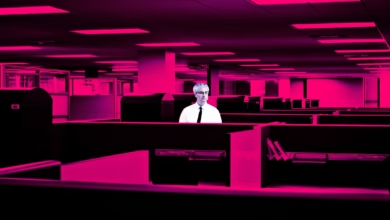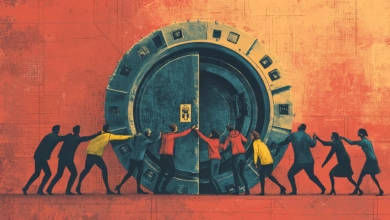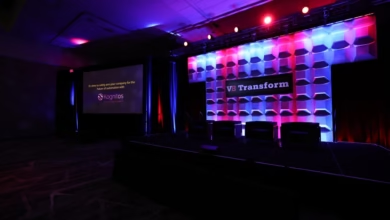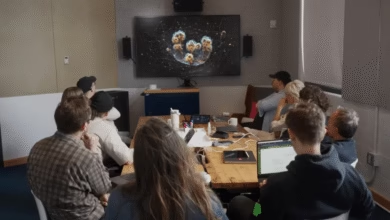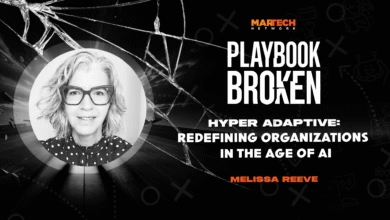AI-Powered Engineering: The Future of Building

▼ Summary
– Salesforce CEO Marc Benioff announced no new engineering hires in 2025, citing a 30% productivity boost from AI, sparking concerns about AI replacing human engineers.
– The real transformation is in engineering work itself, with AI augmenting rather than replacing jobs, as seen in Gartner’s prediction of 33% enterprise AI adoption by 2028.
– Demand for engineers with AI expertise is surging, with firms aggressively recruiting for roles focused on generative AI and AI implementation.
– AI enhances engineering through summarization, inferencing, code conversion, and content generation, improving efficiency across industries like healthcare and finance.
– New skills like LLMOps and AI governance are emerging, emphasizing collaboration between humans and AI, with engineers remaining essential for ethical and creative decision-making.
The engineering landscape is undergoing a seismic shift as artificial intelligence transforms how professionals approach complex problems. Recent announcements from major tech leaders have sparked debates about AI replacing human engineers, but the reality is far more nuanced. Rather than eliminating jobs, AI is reshaping the engineering profession by augmenting human capabilities and creating new opportunities for those who adapt.
When Salesforce’s CEO mentioned pausing engineering hires while citing AI-driven productivity gains, many misinterpreted this as a sign of human obsolescence. Industry analysts like Gartner predict that by 2028, a third of enterprise applications will incorporate agentic AI—yet this signals evolution, not extinction. The true challenge lies in engineers embracing these tools rather than resisting them.
Demand for AI-savvy engineers has skyrocketed across industries. Consulting firms aggressively recruit professionals with generative AI expertise, while tech companies establish entirely new roles focused on AI integration. The competition for talent capable of leveraging AI effectively has never been fiercer.
Beneath the hype, AI’s impact on engineering manifests in four key ways:
1. Summarization – AI rapidly condenses sprawling documentation, technical specs, and codebases into digestible insights, freeing engineers from tedious manual review.
2. Inferencing – By analyzing patterns, AI flags potential optimizations and bugs, accelerating decision-making with data-driven recommendations.
3. Code Conversion – Legacy system modernization becomes smoother as AI translates between programming languages while preserving institutional knowledge.
4. Expansion – Generative AI assists in drafting novel code, documentation, and system architectures, enabling engineers to explore solutions beyond traditional constraints.
From healthcare to finance, AI-powered engineering unlocks new efficiencies. Pharmaceutical firms optimize drug production schedules to minimize waste, while banks deploy AI to streamline compliance without sacrificing customer experience. These advancements don’t replace engineers—they elevate their impact.
The Rise of New Engineering Specializations
Just as DevOps emerged as a critical discipline, LLMOps (Large Language Model Operations) is gaining traction, focusing on deploying, monitoring, and refining AI models in live environments. Engineers in this space track performance drift, test alternative models, and ensure consistent output quality.
Platform engineering is another growing field, establishing standardized frameworks for secure AI deployment. By providing templates and guardrails, these professionals enable teams to build AI-enhanced applications faster while maintaining security and scalability.
Mastering Human-AI Collaboration
The most successful engineers don’t just use AI—they orchestrate it intelligently. Understanding when to rely on AI suggestions versus human judgment is crucial. Some tasks benefit from full automation, while others demand careful oversight.
AI governance frameworks are essential, balancing innovation with ethical and regulatory compliance. Forward-thinking organizations embed security from the outset, testing for vulnerabilities like hallucinations or data leaks before deployment.
Looking ahead, AI and engineers will form a symbiotic partnership. Current systems still require human guidance, but future iterations may propose unconventional solutions and identify risks humans miss. Yet the core of engineering—translating human needs into ethical, functional systems—remains irreplaceable.
The future belongs to engineers who harness AI as a collaborator, not a competitor. Together, they’ll tackle challenges once deemed impossible—proving that human ingenuity, amplified by AI, is the ultimate advantage.
(Source: VentureBeat)


